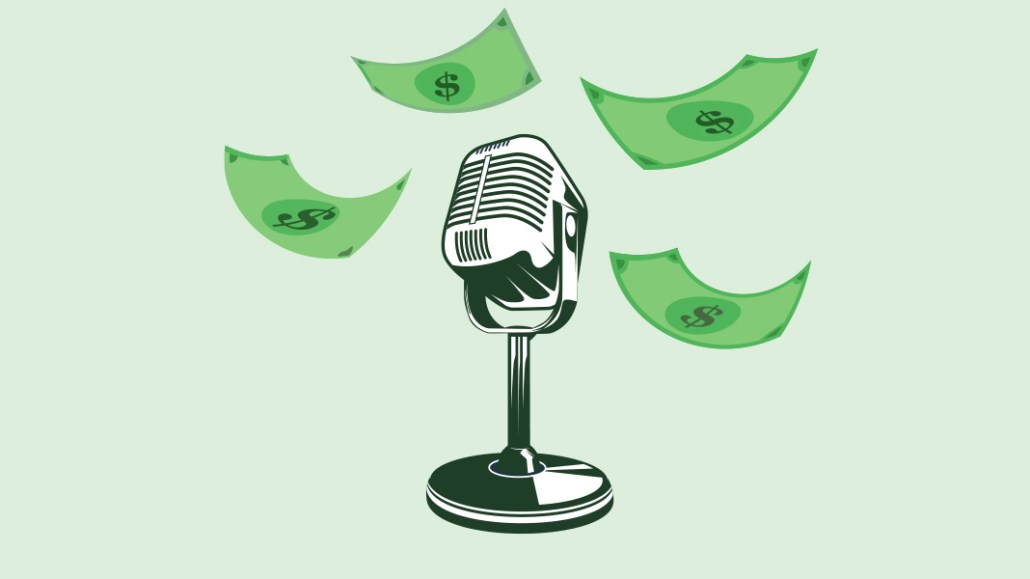Secure your place at the Digiday Media Buying Summit in Nashville, March 2-4

With commuting on hold and everybody Zooming all the time, podcast consumption has taken a bit of a hit as listeners look for new ways to fit shows into their daily routines.
Last month, the analytics firm Chartable released research suggesting that podcast downloads were 10% lower on March 25 than they were on February 26.
Those numbers deserve to be taken with a grain of salt. Chartable, like Podtrac and other podcasting analytics services, is an opt-in analytics service, and many different podcast networks, ranging from Entercom to Vox Media, showed increased listening last month.
But podcasting’s simplicity — and its on-demand nature — has meant that for now, ad revenue continues to grow for the medium, with many brand advertisers content to rework their messaging and keep spending, even as direct response advertisers pause or drop theirs.
That resilience will benefit podcasters unevenly. Even as podcasting continues to grow more sophisticated as a digital media format, good old-fashioned star power still dictates where a lot of its ad dollars go.
“I’d say in my other media, the clients are looking to do more and more targeting,” said Ken Lagana, evp of digital ad sales for Entercom, which reported that its podcasts reached 28 million listeners last month. “But in the podcast space, what people come to us for are these big names, the big brands.”
Though podcasting has not been immune to the pauses, cancellations and delays that have battered digital media the past few weeks, brand advertising on the format remains healthy: Megaphone, a podcast hosting and monetization platform used by publishers ranging from CBS Interactive to Vox Media, booked around twice as much new business as it lost in March, chief revenue officer Matt Turck said.
And while the company’s second quarter will likely be “softer” than originally forecast, revenue should be up year over year; Turck also expects that Megaphone will hit its revenue forecast for the year, largely because the company began the year on a strong note.
“It doesn’t mean things can’t go sideways,” Turck said, “But we don’t expect them to.”
In 2018, brand advertising represented close to 40% of podcast ad spending, according to the IAB, and branded content made up another 10%. The rest came from direct response advertisers, which have been the bedrock of podcasting since its beginnings.
But as coronavirus has up-ended global supply chains and seized up the world’s economies, many direct response advertisers have had to pause or cancel their ad spending. For example, ZipRecruiter, a digital recruiting tool, has paused its ad spending with many companies instituting hiring freezes; a number of meal kit brands, have also paused their spending on podcasts.
“In our case, the majority of cancellations and rebooking has all been from DR [direct response] clients,” said Erik Diehn, the CEO of Stitcher. “Especially dealing with DTC brands that are venture-funded and going into cash preservation mode.”
Though brand advertisers are dealing with the same issues, many have been able to pivot their podcast messaging more quickly than possible for other digital media formats.
“Audio’s much easier and much more efficient to change,” said Stephanie Beran Sanderson, the director of strategy at creative audio agency Wordsworth and Booth, which has reworked several client spots over the past five weeks.
Indeed, while branded content and video ad production have slowed to a crawl for publishers and agencies, most of the tools and resources needed to produce new podcast ads are already accessible to producers stuck at home. A brand that wants to change its messaging and assets for a podcast campaign can overhaul everything in a matter of days, Beran Sanderson said.
That quick turnaround does not apply to branded podcasts, which many brands are holding back until some measure of normalcy returns to daily life, Lagana said.
But until that sense of normalcy returns, podcasts with established loyal audiences ought to be able to weather the storm. “Podcast is appointment listening,” Diehn said.
More in Media

Media Briefing: Turning scraped content into paid assets — Amazon and Microsoft build AI marketplaces
Amazon plans an AI content marketplace to join Microsoft’s efforts and pay publishers — but it relies on AI com stop scraping for free.

Overheard at the Digiday AI Marketing Strategies event
Marketers, brands, and tech companies chat in-person at Digiday’s AI Marketing Strategies event about internal friction, how best to use AI tools, and more.

Digiday+ Research: Dow Jones, Business Insider and other publishers on AI-driven search
This report explores how publishers are navigating search as AI reshapes how people access information and how publishers monetize content.








